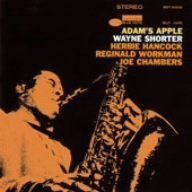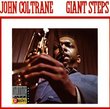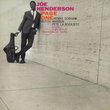| All Artists: Wayne Shorter Title: Adams Apple Members Wishing: 4 Total Copies: 0 Label: EMI Japan Release Date: 10/22/2008 Album Type: Import Genres: Jazz, Pop Styles: Modern Postbebop, Bebop Number of Discs: 1 SwapaCD Credits: 1 |
Search - Wayne Shorter :: Adams Apple
 | Wayne Shorter Adams Apple Genres: Jazz, Pop
Japanese pressing includes one bonus track. EMI. 2008. |
Larger Image |
CD DetailsSynopsis
Album Description Japanese pressing includes one bonus track. EMI. 2008. Similar CDs
|
CD ReviewsClassic Wayne with some isolated flaws Douglas Gray | Rochester, NY | 03/14/2000 (5 out of 5 stars) "Recorded in February 1966, this fifth of Wayne's original releases for Blue Note contains some of Wayne Shorter's (tenor sax) best work and some great interplay with the other members of the quartet. It represents a welcome return, for the most part, to the utterly unique stylings of Wayne not found on his previous release, 'The All Seeing Eye', which has not to my knowledge been released since the original LP issue, and was, in my opinion, a failed experiment. Herbie Hancock (piano) is at his very, very best as an accompanist, but is average as a soloist. Reggie Workman (bass) and Joe Chambers (drums) are solid throughout, ranging from average to masterful supporting roles. This quartet is quite familiar with one another, and it shows.This album shows more diversity than other Wayne albums of the period. There's two ballads, a latino-flavored work, some funk, a bit of the avant-garde, and plenty of Wayne's original compositions and uniquely expressive tenor work.The recording quality is superb, although Reggie gets a little lost in the background at times.Adam's Apple - This sub-par Wayne composition features a soothing and colorful melody over an eventually monotonous funky blues feel - not the sort of groove we've come to expect from Wayne. Herbie's solo is not much more than a slight variation on the groove with a quiet right hand. Wayne seems unable to express himself easily within the uninspiring surroundings. Why this is the title track I'll never know. (This piece was recorded on a different date than the remainder, and it shows.)502 Blues - The relaxed 3/4 swing piece, attributed to Jimmy Rowles, showcases Wayne's rich, warm tenor sound - a contrast to the gutsy, explosive sound we're become accustomed to. Wayne solos first, and he displays his prettier side quite nicely, behind some inventive accompaniment from Herbie and Reggie, while Joe keeps it pretty straight in back. Herbie finishes with a colorful solo of his own, then out.El Gaucho - A wonderful Wayne composition in a rare latino straight 4/4 feel. Wayne takes honors, and delivers an average improvisation behind Herbie's ingenious accompaniment. Wayne and Herbie are so in sync with each other, it's hard to tell who's leading whom. Herbie follows and delivers another colorful, yet subdued solo.Footprints - One of Wayne's best-known compositions - in 6/8 - a popular meter for Wayne. The melody and accompaniment are haunting and provocative. Wayne's solo is one of his most expressive of the session. Herbie's backup and solo is rich and inventive. Reggie executes a fine solo as well.Teru - A haunting and expressive Wayne ballad. Wayne, again, shows his command of his horn in this uniquely rich, thoughtful and sensitive piece. Wayne's sound is so superbly warm and expressive, it sends shivers down my spine. Herbie and Reggie are remarkably comfortable and colorful in this open, quiet, snail-paced masterpiece.Chief Crazy Horse - Ditto. Another classically Wayne composition with the classically haunting tenor work of the now fully matured and self-assured master. Wayne delivers another memorable improvisation behind the provocation of his rhythm section working in inventive unison, urging him on. Joe is particularly inventive during this piece, showing his best work of the session. Herbie's solo is played primarily with both hands together, and not very melodic, but nice. Joe does some great fill work near the end, and then Wayne takes it home.The Collector - A Herbie composition, not found on the original LP, borders on the avant-garde. Wayne seems a bit uncomfortable in the free tonality of the work, and appears to hunt for a means of expression. He never quite finds it. Herbie, too, seems to struggle a bit in his own domain. Reggie, on the other hand, appears quite comfortable, and delivers an interesting improvisation. Joe solos too, and does fine. In the end, the work lacks the collaborative sensibility of the rest of the session.With the exception of the title track, 'Adam's Apple' and Herbie's 'The Collector', this is classic mid-sixties Wayne, and a *must have* for any Wayne enthusiast. Not as strong or as consistent as Wayne's 'JuJu', perhaps Wayne's best album, 'Adam's Apple' rates closely with 'Speak No Evil', 'Night Dreamer' and the later-released 'Etcetera', all 5-star albums, in my opinion."
|

 Track Listings (7) - Disc #1
Track Listings (7) - Disc #1
